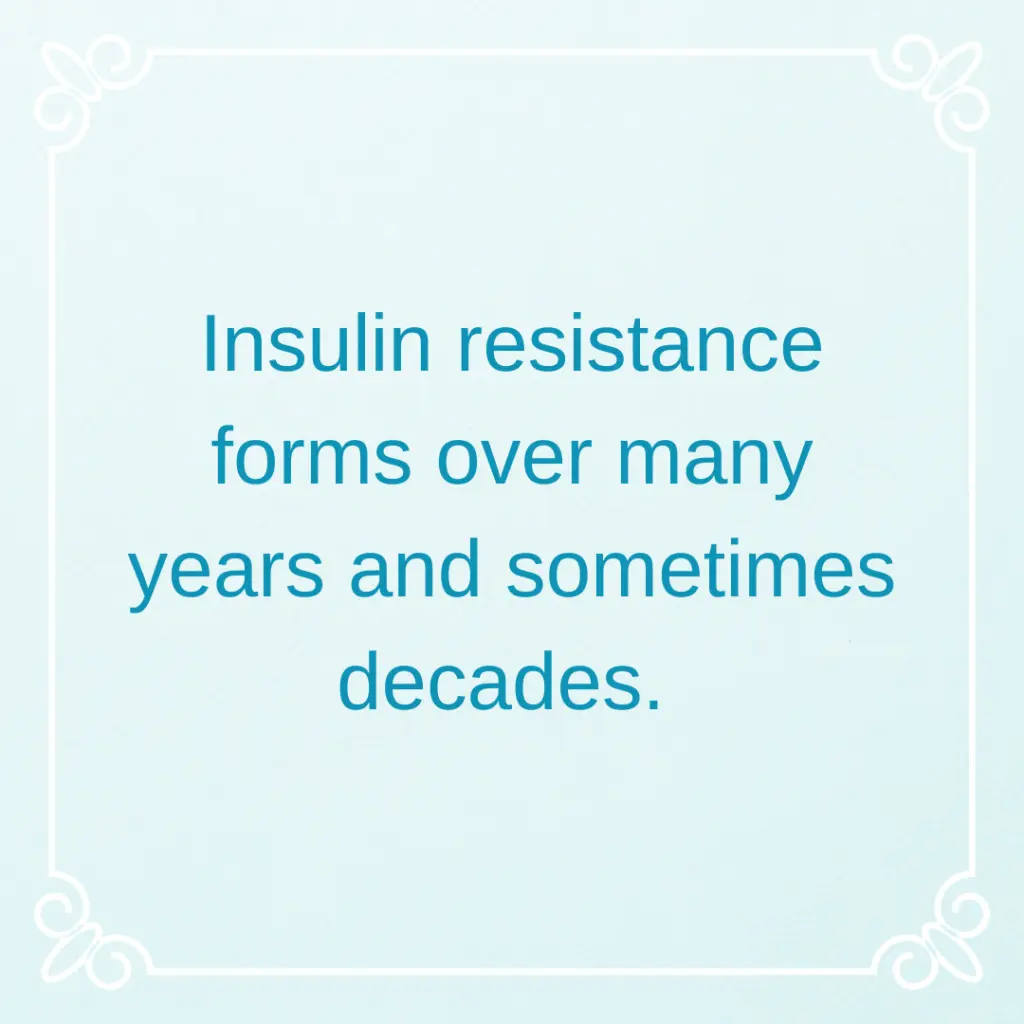How Insulin Affects Weight Loss: What You Need To Know
Did you know that insulin affects weight loss? You may have heard about the calories in vs calories out equation. It goes like this:
- Maintain weight: calories in = calories out
- Gain weight: calories in > calories out
- Lose weight: calories in < calories out
To maintain our weight, we need to use or “burn” the same amount of calories that we consume. To gain weight, we need to eat more than we burn. And to lose weight we need to eat less and move more so that we create a calorie deficit.
Seems pretty straightforward and logical, right? The problem is that calories are not the only predictor of whether you gain weight or lose weight. A calorie is a unit of energy. We associate calories with our food, but actually, a lump of wood or coal has calories.
Our body regulates our metabolism to maintain homeostasis. When we consume fewer calories, we may lose weight at first, but our body will slow our metabolism down to maintain homeostasis. Once we are back in balance, weight loss stops. You may have experienced this frustration with your own weight loss efforts. Restricting calories day after day, week after week, only to step on the scale and see the same number staring back at you.
So what can you do? We now understand that hormones regulate body weight and metabolism. The hormone with the most influence is insulin.
In this article, we’ll discover more about this incredible hormone. How does insulin work? What is insulin resistance? What is insulin sensitivity? Can we use it to help with weight loss? And what role does insulin play in intermittent fasting?
What is insulin?
Before we talk about how insulin affects weight loss, we need to get clear on what insulin is.
Insulin is a hormone. The pancreas produces insulin and it helps the body control the level of sugar, or glucose, in your blood. Insulin is a regulator hormone. It regulates the amount of glucose you have in your bloodstream. When insulin is present, your body stores fat to use later. When insulin is low, your body releases fat for energy use. Without insulin, your blood glucose levels would stay elevated.
How does insulin work?
Picture this: Insulin is a little yellow bus traveling through your blood. As it travels, it picks up glucose from your blood and delivers it to your cells. When it arrives at the cell, or “bus stop”, it uses its special key to unlock the cell. The glucose gets off the insulin bus and steps into the cell. Once inside, the cell converts the glucose into energy or stores it to use later. This happens over and over again, all along the bus route. The insulin continues to pick up and clear glucose from the blood until it’s all taken care of.
Without insulin, your body would waste away because you wouldn’t be able to get the glucose from your blood and into your cells to produce energy. The lack of insulin is a characteristic of type 1 diabetes. If you have type 1 diabetes, your pancreas makes very little or no insulin. But with type 2 diabetes, your body resists the effects of insulin. Your body becomes insulin resistant.
The level of insulin in your blood is directly related to the level of glucose. The more glucose you have, the more insulin you need. The goal is to release enough insulin for the amount of glucose in the blood. We want them to work hand in hand. But when you have too much insulin, that delicate balance is thrown off. Next, we’ll talk about how this can lead to insulin resistance.
Insulin Resistance
Let’s use our little yellow insulin bus analogy again. Insulin resistance is when you have a normal amount of glucose in your blood, but the current number of insulin buses is not enough to take care of it. Your pancreas sends out more little yellow insulin buses. It takes more insulin to pick up and clear the same amount of glucose. But now you have high levels of insulin in your blood.

Insulin resistance forms over many years and sometimes even decades. Persistently high levels of insulin over time leads to insulin resistance. If your insulin level stays high all the time, it blocks the body’s ability to use your fat stores. Why? Because when you have glucose readily available, your body does not go into your fat stores to get energy. It doesn’t need to.
This makes it incredibly hard to lose weight. And the longer you’ve had extra weight, the harder it is to lose. If you’ve been overweight for a short time, it’s easier to take that extra weight off.
But insulin resistance isn’t actually an issue with insulin or even glucose. It’s an issue with the cell. When the cell is full, it has no more room for the glucose trying to get in the door. The insulin has unlocked the cell door and is trying to shove the glucose in, but there’s no room. This is insulin resistance. The cell is resisting the efforts of the insulin.
Imagine a box full of balloons. It’s completely full but you have three more balloons that you want to put in. You open the box just a little and try to push the balloons in. They still won’t go in. You call a friend to help you. But still, no luck getting those last three balloons in the already too full box. This is the problem your insulin has. It calls for back-up, but even then, it still can’t get that glucose into the full cell.
You can start to see how insulin affects weight loss. Now that we know we don’t want insulin resistance, what do we want? We want insulin sensitivity.
What Does Insulin Sensitivity Mean?
Insulin sensitivity describes how sensitive your body’s cells are in response to insulin.
When you have low insulin sensitivity — you have insulin resistance and need more insulin.
When you have high insulin sensitivity — you need smaller amounts of insulin.
High insulin sensitivity means you need less insulin to move the glucose out of your bloodstream. So, is it good to be insulin sensitive? Yes! When you’re insulin sensitive, you are very efficient at using less insulin to clear the glucose from your bloodstream.
Low insulin sensitivity, or insulin resistance, can lead to type 2 diabetes. We are all unique individuals and our insulin sensitivity can change over time. Our lifestyle and diet play a role in how sensitive we are to insulin.
There are a few things you can do to change your level of insulin sensitivity. You can:
- Exercise — move more throughout the day.
- Get more sleep — even just one more hour per night can help.
- Dietary changes — eat fewer carbs, more unsaturated fats, and more fiber.
- Supplementation — add a probiotic and omega 3.
- Intermittent fasting — reduces insulin resistance.
Insulin Resistance Diet
How can changing your diet help with insulin resistance?
Remember, when your blood glucose goes up, your insulin goes up. How does blood glucose go up? That depends on the types of food you eat. A high carb meal will raise your blood glucose, and thus your insulin, to higher levels than a lower carb meal.
Certain types of carbohydrates, like starch and sugar, are quickly broken down into glucose. This allows them to enter your bloodstream quickly and raises your blood glucose (or blood sugar) levels.
When your insulin levels are high, that means you are using the available glucose for energy. You’re not burning your fat stores. But as glucose clears from your bloodstream, insulin levels drop back down. Now that you don’t have all that ready energy from food available, your body will turn to your fat stores for energy.
An insulin resistance diet can help you keep your insulin levels from spiking. So what’s the best insulin resistance diet? I bet you can guess. Foods that are highly processed like white bread, pasta, and soda can spike blood glucose levels. Eating foods that are lower in carbohydrates, have more fiber, and have healthy unsaturated fats can help raise insulin levels at a slower rate.
Best foods for an insulin resistant diet
Try to avoid or limit highly processed foods. Choose foods like:
- Whole grains
- Fatty fish
- Non-starchy and fibrous vegetables
- Avocado
- Nuts and seeds
- Fresh fruit like strawberries, raspberries, and blackberries
- Beans and Legumes
- Olive oil
Carbohydrates have the biggest impact on blood sugar. Proteins have a moderate impact and fats have little to no impact on blood sugar. If you eat in a way that keeps insulin low, you will stay in a fat-burning mode. When insulin is low, your body can release fatty acids from your fat stores to use as fuel. Wouldn’t you rather use your fat stores for energy?
Along with diet, there is another amazing tool you can use to help your body keep insulin levels low and use your stored fat for energy. It’s called intermittent fasting.
How Intermittent Fasting Helps with Weight Loss
Out with the old, in with the … old? You may be new to intermittent fasting, but the practice of fasting isn’t new. In fact, it’s been around since the time of Hippocrates in 500 B.C.
Intermittent fasting is not about restricting calories. Remember the calories in vs calories out equation? We learned that this approach alone to weight loss doesn’t completely work. Science aside, just ask anyone who’s tried it. It’s incredibly hard and very ineffective in the long run.
Intermittent fasting has many health benefits. If you’re looking for weight loss, intermittent fasting (IF) can help. The purpose of fasting is to lower insulin. When you eat, insulin is released. This is a normal physiological response. We need insulin to clear the glucose from our bloodstream so we can use it for energy or store it for later. This is one way in which insulin affects weight loss or weight gain.
When your pancreas releases insulin, a signal is also sent to the fat cells to stop releasing fat for energy. The fat energy is no longer needed because you’ve just eaten and food energy is on the way.
You can only use one source of energy at a time. You either use the energy coming into the body through food consumption, or you use the energy stored in your body’s fat cells.
How intermittent fasting works
Here’s an example. Say you eat 1500 calories throughout your day. Each time you eat, your pancreas releases insulin. The insulin shuttles the glucose to your cells and you use it for energy. If you don’t need all that energy during your day, your body will store it for later. If you are eating a little here and a little there, all through the day, your insulin level will stay elevated and you will not need to tap into your fat stores.
What if, instead of eating 1500 calories throughout your day, you eat them in a more condensed time. This is often called time restricted eating. Here’s how it works: You choose a window of time where you will eat. Most people start with an eight-hour eating window. During those eight hours, you eat your meals. Once the eight hours are over, you stop eating.
If you are eating during eight hours of the day, that means there are sixteen hours of the day where you are not eating. This is your fasting window. During your fasting window, your insulin levels drop. Once you use all the energy from your food, your body switches to using energy stored in your fat cells. Using stored energy from your fat cells helps you lose the weight you’ve been holding on to.
A combination of intermittent fasting and an insulin resistance diet will help you lose weight consistently and in a healthy way. And that’s what we’re all looking for, right?
Final Thoughts on Insulin and Weight Loss
Insulin is an incredible hormone and plays a big role in regulating not only your blood glucose levels but your fat storage as well. You’ve learned a lot today about insulin, insulin resistance vs insulin sensitivity, and how insulin affects weight loss. All of this can seem overwhelming. But it doesn’t have to be. I’m here to help you navigate the process.
If you’re like most of my clients, you’ve been struggling to lose weight. You’ve tried so many things and you’re frustrated at the lack of results. What if I told you there was a better way to lose weight and find true health? Imagine what your life would be like if you had more energy, more food freedom, more confidence, and more light and life.
My goal is to help you achieve your weight loss and health goals. Take the first step towards your new life. You deserve this!



